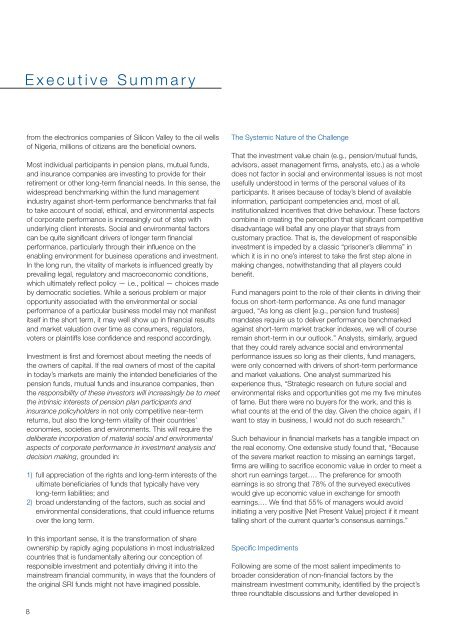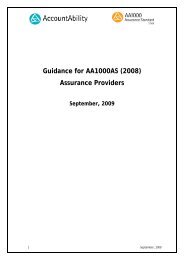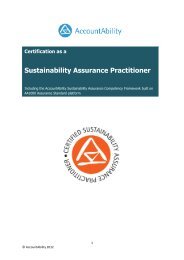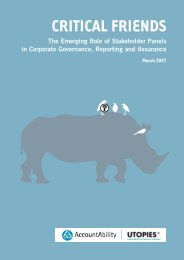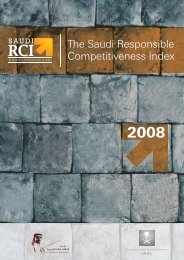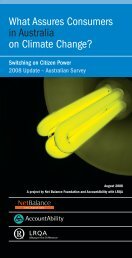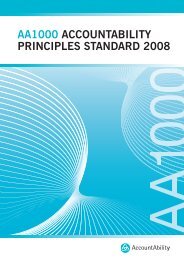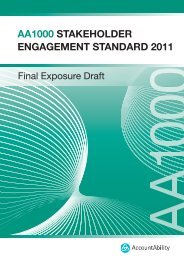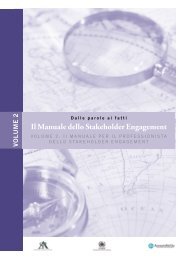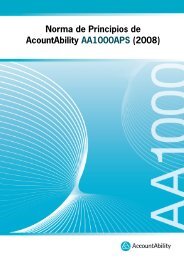Mainstreaming Responsible Investment - AccountAbility
Mainstreaming Responsible Investment - AccountAbility
Mainstreaming Responsible Investment - AccountAbility
Create successful ePaper yourself
Turn your PDF publications into a flip-book with our unique Google optimized e-Paper software.
Executive Summary<br />
from the electronics companies of Silicon Valley to the oil wells<br />
of Nigeria, millions of citizens are the beneficial owners.<br />
Most individual participants in pension plans, mutual funds,<br />
and insurance companies are investing to provide for their<br />
retirement or other long-term financial needs. In this sense, the<br />
widespread benchmarking within the fund management<br />
industry against short-term performance benchmarks that fail<br />
to take account of social, ethical, and environmental aspects<br />
of corporate performance is increasingly out of step with<br />
underlying client interests. Social and environmental factors<br />
can be quite significant drivers of longer term financial<br />
performance, particularly through their influence on the<br />
enabling environment for business operations and investment.<br />
In the long run, the vitality of markets is influenced greatly by<br />
prevailing legal, regulatory and macroeconomic conditions,<br />
which ultimately reflect policy — i.e., political — choices made<br />
by democratic societies. While a serious problem or major<br />
opportunity associated with the environmental or social<br />
performance of a particular business model may not manifest<br />
itself in the short term, it may well show up in financial results<br />
and market valuation over time as consumers, regulators,<br />
voters or plaintiffs lose confidence and respond accordingly.<br />
<strong>Investment</strong> is first and foremost about meeting the needs of<br />
the owners of capital. If the real owners of most of the capital<br />
in today’s markets are mainly the intended beneficiaries of the<br />
pension funds, mutual funds and insurance companies, then<br />
the responsibility of these investors will increasingly be to meet<br />
the intrinsic interests of pension plan participants and<br />
insurance policyholders in not only competitive near-term<br />
returns, but also the long-term vitality of their countries’<br />
economies, societies and environments. This will require the<br />
deliberate incorporation of material social and environmental<br />
aspects of corporate performance in investment analysis and<br />
decision making, grounded in:<br />
1) full appreciation of the rights and long-term interests of the<br />
ultimate beneficiaries of funds that typically have very<br />
long-term liabilities; and<br />
2) broad understanding of the factors, such as social and<br />
environmental considerations, that could influence returns<br />
over the long term.<br />
In this important sense, it is the transformation of share<br />
ownership by rapidly aging populations in most industrialized<br />
countries that is fundamentally altering our conception of<br />
responsible investment and potentially driving it into the<br />
mainstream financial community, in ways that the founders of<br />
the original SRI funds might not have imagined possible.<br />
The Systemic Nature of the Challenge<br />
That the investment value chain (e.g., pension/mutual funds,<br />
advisors, asset management firms, analysts, etc.) as a whole<br />
does not factor in social and environmental issues is not most<br />
usefully understood in terms of the personal values of its<br />
participants. It arises because of today’s blend of available<br />
information, participant competencies and, most of all,<br />
institutionalized incentives that drive behaviour. These factors<br />
combine in creating the perception that significant competitive<br />
disadvantage will befall any one player that strays from<br />
customary practice. That is, the development of responsible<br />
investment is impeded by a classic “prisoner’s dilemma” in<br />
which it is in no one’s interest to take the first step alone in<br />
making changes, notwithstanding that all players could<br />
benefit.<br />
Fund managers point to the role of their clients in driving their<br />
focus on short-term performance. As one fund manager<br />
argued, “As long as client [e.g., pension fund trustees]<br />
mandates require us to deliver performance benchmarked<br />
against short-term market tracker indexes, we will of course<br />
remain short-term in our outlook.” Analysts, similarly, argued<br />
that they could rarely advance social and environmental<br />
performance issues so long as their clients, fund managers,<br />
were only concerned with drivers of short-term performance<br />
and market valuations. One analyst summarized his<br />
experience thus, “Strategic research on future social and<br />
environmental risks and opportunities got me my five minutes<br />
of fame. But there were no buyers for the work, and this is<br />
what counts at the end of the day. Given the choice again, if I<br />
want to stay in business, I would not do such research.”<br />
Such behaviour in financial markets has a tangible impact on<br />
the real economy. One extensive study found that, “Because<br />
of the severe market reaction to missing an earnings target,<br />
firms are willing to sacrifice economic value in order to meet a<br />
short run earnings target…. The preference for smooth<br />
earnings is so strong that 78% of the surveyed executives<br />
would give up economic value in exchange for smooth<br />
earnings.… We find that 55% of managers would avoid<br />
initiating a very positive [Net Present Value] project if it meant<br />
falling short of the current quarter’s consensus earnings.”<br />
Specific Impediments<br />
Following are some of the most salient impediments to<br />
broader consideration of non-financial factors by the<br />
mainstream investment community, identified by the project’s<br />
three roundtable discussions and further developed in<br />
8


